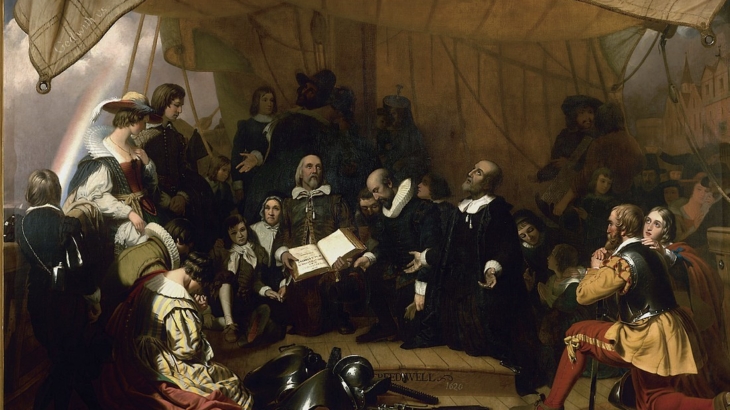Principle of Applying Lessons from Classical History Toward New Governing Devoted to Freedom and Independence
 Essay Read By Constituting America Founder, Actress Janine Turner
Essay Read By Constituting America Founder, Actress Janine Turner
Christianity in the Roman Empire was first persecuted, then tolerated, and later adopted as the official religion. The latter development was to the long-term detriment of the faith because, as the Church adopted the structures and procedures of Roman imperial government, it became ever more corrupt, as had the Roman government itself during previous centuries.
The details of this process are beyond the scope of this essay, but suffice it to say at this point that by 1517 a young German monk by the name of Martin Luther (1483-1546) decided change was needed. He, therefore, wrote and tacked his 95 theses on the church door in Wittenburg and launched what came to be the Protestant Reformation, thereby fracturing western Christianity forever.
Professor Sue Davis correctly described this momentous event as follows: “When Martin Luther . . . posted his ninety-five theses on the door of the castle church at Wittenberg in 1517 he initiated a revolution in politics as well as religion.”[i]
The relevance of the Reformation to the American political system can be understood as follows. First, the Reformation divided a Europe that had followed one central faith for centuries into more than two distinct groups in that there was not one Protestant church/faith/denomination but four, to be followed by more later. These four were the Lutherans, the Calvinists, the Anabaptists and the Anglicans in England.
These four groups not only differed from Catholicism, they differed from each other. It was, therefore, unfortunately inevitable that conflict would break out between them. On the continent this took the form of the Thirty Years’ War (1618-1648) between German Catholics and Lutherans. There were religious civil wars in France between Catholics and Huguenots (French Calvinists). In England it was the Puritan Revolution/English Civil War, 1640-1649, between Anglicans and those called Puritans who wanted to reform the Church of England along Calvinist lines. This resulted in the regicide of King Charles I and the establishment of the Protectorate of Oliver Cromwell in 1649.
These wars had two significant impacts on what was to become the United States. First, many Europeans tired of the seemingly endless slaughter and religious persecution and desired to escape, thereby emigrating to North America and populating the English colonies.[ii]
Second, after flirting with bringing their sectarian conflicts with them, our forefathers decided to do otherwise, ultimately making religious freedom a part of the United States Constitution in its First Amendment. The American tradition of separation of church and state can be traced directly back to the conflicts spawned by the Protestant Reformation.
In addition, the Protestant Reformation forced a fundamental change in political philosophy. The Magna Carta and Aquinas’ Treatise on Law were minor tremors but the Reformation was a major earthquake in that it articulated a right of resistance to unjust authority.
Romans 13 had been the basis of governmental authority in both the church and state for centuries. Remember that Jamestown had been founded in 1607 and Plymouth in 1620, and that the King James translation of the Bible was published in 1611. The first seven verses of Romans 13 in that translation read as follows:
1 Let every soul be subject unto the higher powers. For there is no power but of God: the powers that be are ordained of God.
2 Whosoever therefore resisteth the power, resisteth the ordinance of God: and they that resist shall receive to themselves damnation.
3 For rulers are not a terror to good works, but to the evil. Wilt thou then not be afraid of the power? do that which is good, and thou shalt have praise of the same:
4 For he is the minister of God to thee for good. But if thou do that which is evil, be afraid; for he beareth not the sword in vain: for he is the minister of God, a revenger to execute wrath upon him that doeth evil.
5 Wherefore ye must needs be subject, not only for wrath, but also for conscience sake.
6 For for this cause pay ye tribute also: for they are God’s ministers, attending continually upon this very thing.
7 Render therefore to all their dues: tribute to whom tribute is due; custom to whom custom; fear to whom fear; honour to whom honour.
These powerful words formed the basis of the divine right of kings theory and, in part, the basis of the Pope’s authority in the Church. How could Luther resist the Pope and Church without disobeying Romans 13? He could do so when obeying a higher authority (God) required him to.
According to Luther, it is a sin to obey any authority that forces or tries to force people to do that which is ungodly, unjust, unrighteous, unlawful or, in other words, wrong. A Godly person simply cannot do such things without sinning. As Luther said, “Hier stehe ich; ich kann nicht anders.”
About 150 years later this became “Resistance to tyrants is obedience to God.” The British government was violating God’s law and the Americans had not only the right but the duty to resist. And they did.
 Winfield H. Rose, Ph.D., is Distinguished Professor of Political Science Emeritus at Murray State University.
Winfield H. Rose, Ph.D., is Distinguished Professor of Political Science Emeritus at Murray State University.
[i] Sue Davis, American Political Thought: Four Hundred Years of Ideas and Ideologies. Prentice Hall, 1996, p. 10.
[ii] I acknowledge that some came to the New World for personal and economic reasons rather than for religious and political reasons.
Click here for First Principles of the American Founding 90-Day Study Schedule.
Click here to receive our Daily 90-Day Study Essay emailed directly to your inbox.

 https://en.wikipedia.org/wiki/Mayflower#/media/File:Embarkation_of_the_Pilgrims.jpg
https://en.wikipedia.org/wiki/Mayflower#/media/File:Embarkation_of_the_Pilgrims.jpg
 https://en.wikipedia.org/wiki/Mayflower_Compact
https://en.wikipedia.org/wiki/Mayflower_Compact
Join the discussion! Post your comments below.
Your feedback and insights are welcome.Feel free to contribute!